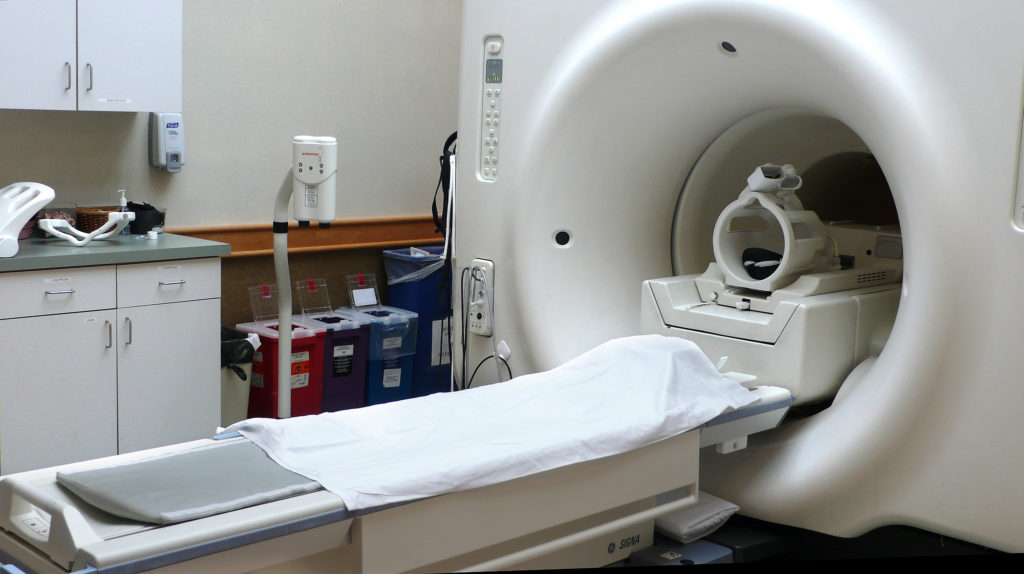
The Breastfeeding Network says that after an MRI or CT scan with contrast dye, it’s fine to continue breastfeeding. However, NHS hospital policies or patient information sometimes state that women need to stop breastfeeding for 24 hours after the scan, which can be practically difficult and can present health risks for mother and baby. I’ve searched for online information from NHS hospitals regarding breastfeeding after MRI scans and have copied below the relevant sections. Please get in touch if you know of any other local information I could add, know that any of the information below has changed or have any other suggestions.
1) National NHS information
“When your doctor refers you for an MRI scan, tell them if: …
- you’re pregnant or breastfeeding”
“When your doctor refers you for an MRI scan, tell them if: …
- you’re pregnant or breastfeeding”
“Before having an MRI scan, you should tell medical staff if: …
- you’re pregnant or breastfeeding”
2) Policies that advise mothers to stop breastfeeding for a period of time
University Hospital Southampton
If you are breastfeeding and we give you a contrast dye injection, we advise that you do not breastfeed for 24 hours afterwards. You should express and discard breast milk during this time. If you know or think you might be pregnant, or are currently breastfeeding, you should telephone us for advice as soon as you receive your appointment letter.
If you are breastfeeding please contact the department as you may need an injection of contrast agent (dye) which means you will be unable to breastfeed for a period of time after your MRI, usually 24 hours.
Chelsea and Westminster Hospital
“Breastfeeding mothers should be aware that the contrast agent can cause breast milk to taste slightly bitter, and so they are advised not to breastfeed for 24 hours after their injection.”
Also: “Not everyone is suitable for an MRI scan and it is important that you let us know if you: are breastfeeding.”
3) Policies that ask mothers to inform staff if they’re breastfeeding
Surrey and Sussex Health care NHS Trust
Are you breast-feeding? Y / N If yes, please contact us on 01737 231721
Hull and East Yorkshire Hospitals Trust
“If you are currently breast-feeding please inform the radiographer before a “contrast agent” is injected so they can discuss precautions you should take.”
MRI: “Please inform the radiographer if you have any allergies or you are breast-feeding.
“Breast Feeding Status
Breast Feeding ❏ Not Breast Feeding ❏”
Cardiac MRI Scan: “Please contact us if: …
-
You are pregnant or breastfeeding.”
Royal Berkshire NHS Foundation Trust
“Who should not have MRI? MRI in most people is very safe; however, please inform a member of staff if you: … Are pregnant or breastfeeding.”
“Tell the radiographer doing the test if you: …
- Are pregnant or may be pregnant or are breastfeeding”
“If you are breast-feeding and are having a scan that uses dye we would ask you to contact us BEFORE your appointment.”
4) Policies that suggest it’s better not to scan breastfeeding women
“We prefer not to scan patients who are pregnant or breast feeding unless the scan is urgent, but this will be discussed with you beforehand.”
“Ladies, before carrying out the scan, it is very important that we know if you are breastfeeding or are (or think you may be) pregnant. If this is the case, please contact us in advance as it may be necessary to delay your appointment.”
Nottingham University Hospitals
What are the reasons I may not be able to have an MRI scan?
Because an MRI scan involves the use of very strong magnets you may not be able to have this type of scan if you: …
- are breast feeding
… You must let the doctors or radiology staff know if any of these apply to you. Please ring the MRI department on: 0115 875 4583. If you don’t your scan may not be done.
5) Policies that explain that there is no evidence of risk, but still suggest that you could express and discard the milk if you wish
“Can I breastfeed after the injection? Current guidelines state that it is safe to breastfeed following the injection of contrast dye as so little dye is passed to the baby via the breastmilk. Alternatively, if you prefer, you can express and discard the breast milk for 24hrs following the scan.”
Although it is not necessarily recommended to express and discard breastmilk after having contrast, you may do so if you wish.
James Paget University Hospitals
“If you are breastfeeding, a very small quantity of the contrast passes into a mother’s milk. Although this is not considered to be a problem, some mothers prefer to stop breastfeeding for a period of 24 hours after having MRI contrast.”
6) Policies that recommend seeking advice from a clinician
Breast feeding mothers that require the dye may suspend breastfeeding for 24 hours at their discretion and after discussion with their clinician.
MRI: “If your scan requires contrast we can provide you with up to date guidance on your breastfeeding.”
7) Policy that says it’s fine to continue breastfeeding
University Hospitals Coventry and Warwickshire
“If you are breast-feeding, it is safe to continue normal breast-feeding after the gadolinium contrast medium has been given. There is no requirement to express and dispose of breast milk or to withhold breast-feeding. Although the gadolinium is eliminated from the body through the kidneys, if you are breast-feeding, it has been shown that a tiny part (less than 1 part in 1000) of the injected gadolinium can enter the breast milk. An even smaller amount of gadolinium from the breast milk might be swallowed by the baby and taken into the baby’s bloodstream. The amount received by your baby is so small it is not thought to represent any danger to your child.”
This list was originally compiled by Hannah Lynes, based on a Google search (search terms MRI NHS breastfeeding) on 12 September 2016 and was last updated on 30th January 2023.
Photo credit: Liz West

Thank you. Really useful. Been advised today at Queen’s Medical, Nottingham to not breastfeed for 48 hours. Was advised by Derby in March to suspend feeding for 24 but then given useful article from Breastfeeding Network via breastfeeding support person on the ward which lead to us continuing breastfeeding, which was so important at the time as our baby was only two days old. Really confusing for parents that advice is not standardised across all trusts.
Hi Lucy. Yes, it’s frustrating that the advice varies so much and that it’s often not consistent with the Breastfeeding Network advice. I’m glad you saw the breastfeeding support person when you did so you were able to continue breastfeeding.
Thank you for this. How strange there is so much conflicting advice from different trusts! I’m having my MRI with contrast done this week at Oxford University Hospital so I’ll be able to update you then with their advice. My baby is only 2 months old and EBF so I don’t see how stopping breastfeeding for 24 hours would work! Regarding the advice given – I did get an MRI scan when I was pregnant but without the contrast.
Thanks for this, I just had an MRI at Cambridge hospital and was told to not breastfeed for 24 hours and pump and dump! I wanted to check for myself the research and reasoning so this has been helpful. Do wish advice was consistent though!
Hi Roshni. Thanks for the update. It might be worth passing on that feedback to Rosie MNVP in case they can raise it with the hospital . I should get round to updating this page soon as some of these policies may have changed. The facts haven’t changed though.
Wish I saw this before I cancelled my appointment. Woke up early 6am and my baby, prepared a bottle and dropped him off at sisters. I was there even at the hospitals waiting room ready to go and lady tells me I can’t breastfeed for 48 hours I was shocked and upset. Not even possible. I had to walk and leave. They need to leave mums to make the decision of the risks themselves! Now I’m totally gutted after reading this article as I really needed that scan over and done with.
How frustrating for you. Definitely worth contacting them with the BfN guidance and saying you’re willing to take responsibility for the decision to continue breastfeeding. Maybe you could consider giving them some feedback as well. I’m not a lawyer, but it seems like sex discrimination to me.